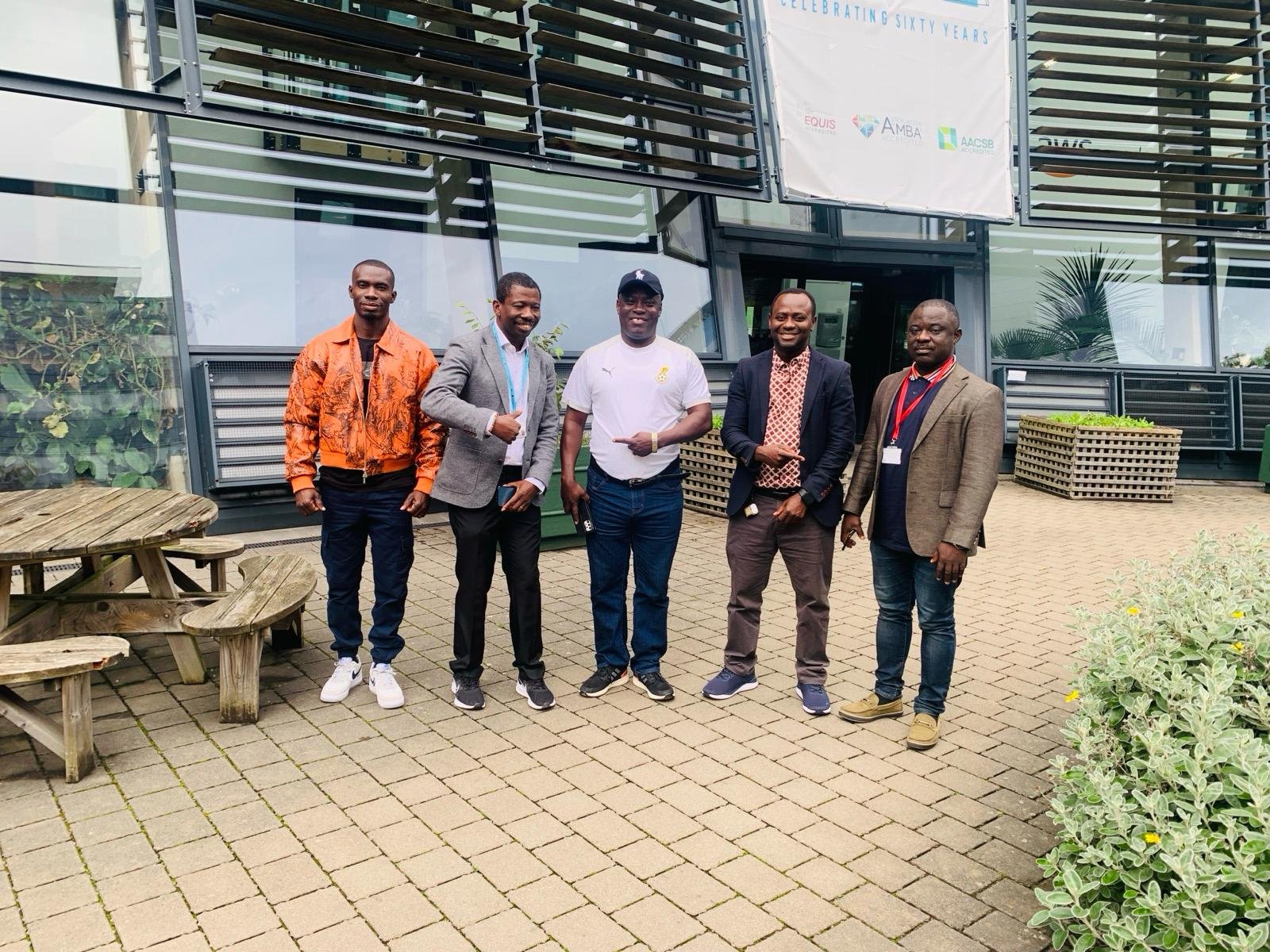
INTERNATIONAL CONFERENCE ON AFRICAN DEVELOPMENT
iCAD 2025 Call for Papers
18th – 20th June 2025 | Aston University
Sustainable Development and Youth Employment in Africa: Challenges and Way Forward
CONFERENCE THEME
VENUE: Aston University Business School, Birmingham, UK
SUBMISSION DEADLINE: 30th April 2025
REGISTRATION FEE: £150 for early bird (up to May 19, 2025) and £175 for later registration
REGISTRATION DEADLINE: June 12, 2025
Conference funding, submission, and registration
To submit your paper, click iCAD 2025 to proceed with submission. If you experience any challenges, please do not hesitate to contact admin@ghscholars.com for assistance.




-
BACKGROUND
Africa faces an acute youth unemployment crisis. Over 12 million young people enter the job market every year, but only about 3 million formal jobs are created annually (Filmer & Fox, 2014; African Development Bank, 2021). With over 60% of Africa’s population under the age of 25, this demographic represents both a significant challenge and a potential driver for economic growth (ILO, 2020). High levels of unemployment not only exacerbate poverty and inequality but also hinder the continent's progress toward sustainable development (World Bank, 2020).
The conference aims to address this challenge by leveraging all available academic and industry expertise and the resources of the British Council, a global leader in promoting international cultural and educational opportunities. The British Council plays a pivotal role in fostering cross-border collaboration, facilitating knowledge exchange, and supporting innovative solutions to global challenges like youth unemployment. Through its partnerships, the British Council contributes to developing programmes that empower young people with the skills, education, and opportunities they need to thrive in a rapidly changing world.
Addressing youth unemployment is essential for achieving several SDGs, including Goal 4 (Quality Education), Goal 5 (Gender Equality), Goal 10 (Reduced Inequality), and Goal 13 (Climate Action) (UNDP, 2019; UNECA, 2021). Sustainable youth employment can drive innovation in sectors like agriculture, energy, health, and technology, helping to solve broader socio-economic challenges. By creating jobs and empowering young people through education, skills development, and entrepreneurship, African countries can achieve inclusive economic growth, reduce social inequalities, and promote sustainable livelihoods.
Africa’s problems are complex; therefore, we need a cross-disciplinary lens to find holistically enduring solutions. Using the interdisciplinary approach ensures the integration of international best practices and standards, enhancing the effectiveness of strategies aimed at addressing youth unemployment and fostering long-term development across Africa.
OBJECTIVES
Development handouts given to African leaders over the years have not worked. African professionals and African researchers are best placed to uncover the enduring solutions Africa needs to develop. The International Conference on African Development is organised by the Ghana Scholarly Society in collaboration with the British Council. It seeks to retrace Africa’s history and shift the narrative through scholarly exploration and research to find innovative solutions for the continent’s future development. The 2025 theme, "Sustainable Development and Youth Employment in Africa: Challenges and Way Forward," addresses the urgent issue of youth unemployment across the continent. The conference will explore how innovative employment strategies can be harnessed to achieve the UN Sustainable Development Goals (SDGs), with a particular focus on Goal 8 (Decent Work and Economic Growth) and Goal 1 (No Poverty). By aligning youth employment with sustainable development, this event aims to highlight actionable pathways toward long-term prosperity and inclusive economic growth for Africa’s future. The British Council’s involvement underscores its commitment to fostering dialogue, building partnerships, and promoting education and innovation to address the continent’s most pressing socio-economic challenges.
-
The conference is open to all academics and professionals around the world whose work focuses on Africa and/or sustainable development. There will be (6) broad areas. Submissions are welcome to any of these areas of interest. Each area will have an experienced academic/industry speaker, an early career researcher (ECR)/industry speaker and multiple opportunities for oral presentations based on a competitive abstract submission. The conference will also have paper development workshops, CV, and interview technique workshops.
1. Business and Management Track
Theme: Entrepreneurship, Innovation, and Corporate Strategies for Youth Employment
This track explores how business practices, innovation, and entrepreneurship can create sustainable employment opportunities for youth. Topics may include:Developing entrepreneurship ecosystems for African youth.
The role of small and medium enterprises (SMEs) in addressing youth unemployment.
Entrepreneurship and well-being.
Corporate social responsibility (CSR) as a tool for youth job creation.
Organizational innovation and leadership strategies to foster youth inclusion in the workforce.
Private sector engagement in youth development.
Track chair(s)
Prof. David Sarpong. Aston University, Birmingham: d.sarpong1@aston.ac.uk
Dr Samuel Adomako, University of Birmingham: s.adomako@bham.ac.uk
Dr Francis Donbesuur, University of Leicester: f.donbesuur@leicester.ac.uk
2. Economics, Finance, and Accounting Track
Theme: Economic Policies, Financial Inclusion, and Youth Employment
This track focuses on the economic and financial frameworks that support or hinder youth employment in Africa. Research on economic policies, financial tools, and the role of domestic and international finance is welcome. Topics may include:The effectiveness of economic policies in reducing youth unemployment.
Financial inclusion, access to credit, and their role in youth entrepreneurship.
The impact of remittances and foreign direct investment (FDI) on youth employment.
Youth savings and financial literacy.
Fiscal policies and youth employment.
Track chair(s)
Dr Albert Danso, De Montfort University, Leicester: albert.danso@dmu.ac.uk
Dr Rexford Attah-Boakye, University of Bradford: r.attah-boakye@bradford.ac.uk
3. AI, Data Analytics, Computing, and Digital Technologies Track
Theme: Technology, Digital Innovation, and the Future of Work for African Youth
This track investigates how technology, artificial intelligence (AI), and data analytics are shaping the future of work and youth employment in Africa. Topics may include:The role of digital platforms in enhancing employability for young people.
AI and automation: opportunities and challenges for future job markets.
Digital entrepreneurship and the rise of tech-driven innovation hubs for youth.
E-learning, digital skills, and youth employment.
Blockchain and digital finance for youth entrepreneurs.
Track chair(s)
Prof Michael Opoku Agyemang- University of Northampton: Michael.OpokuAgyeman@northampton.ac.uk
4.Health and Medicine Track
Theme: Scientific Innovation for Sustainable Youth Employment. This track examines how advancements in health and medicine contribute to job creation and sustainable development. Topics may include:
Innovations in the health and medical fields that offer new job prospects for youth.
Biotechnology and its role in health sector job creation.
Addressing workforce gaps in healthcare delivery and systems.
Public health innovations and their impact on youth employability.
Track chair(s)
Dr Kofi Asare-Addo, University of Huddersfield: K.Asare-Addo@hud.ac.uk
Dr Kenny Omo, University of Central Lancashire: Komoniala@uclan.ac.uk
Dr Sandra Appiah, Middlesex University: s.appiah@mdx.ac.uk
5. Engineering and Construction Track
Theme: Engineering and Construction Innovations for Youth Employment. This track explores how engineering advancements and developments in the construction sector can drive youth employment and contribute to sustainable development. Topics may include
Employment opportunities in green technologies and sustainable energy projects.
Advancements in construction technology and infrastructure development for job creation.
The role of engineering education in enhancing employability and workforce readiness.
Innovations in sustainable construction practices and smart city development.
Track chair(s)
Dr Joseph K. Ofori Kuragu, Anglia Ruskin University: joseph.ofori@aru.ac.uk
Dr Philip K. Quainoo, University of Northampton: philipvis@yahoo.co.uk
6. Law and Society Track
Theme: Legal Frameworks, Governance, and Rights-Based Approaches to Youth Employment
This track focuses on the intersection of law, governance, and societal factors in promoting youth employment. It encourages research on legal frameworks, labour rights, and governance structures that affect job creation for young people. Topics may include:
Labour Law, Intellectual Property, AI, digitalisation, social protection, and Corporate Law.
Contract, Commercial, Consumer and Competition, and Banking & Financial Services Law.
International law, Human rights, Conflict and Social Justice, Criminal Law and Criminal Justice.
Environmental Law, Energy and Natural Resources Law, Cyberlaw, and youth employment.
Law, Institutions, sub-regional and regional institutions, Gender, law and development.
Governance reforms and anti-corruption measures and their role in job creation for African youth.
All other relevant areas of law that underpin development and youth employment.
Track chair(s)
Dr Nuhu Yidana – SOAS University of London: ny4@soas.ac.uk
Dr Shun Oshita, Surugadai University, Japan: a.peace.world@suou.waseda.jp
7. Social Science and Development Track
Theme: Development, Inclusivity, Social Change and Youth Futures
This track explores the social and developmental aspects of youth employment, focusing on education, gender, and inclusive growth. It encourages research on how social sciences contribute to reducing unemployment and driving development. Topics may include:Education reforms and skills development programs to enhance employability.
The role of social inclusion, gender equality, and rural development in creating job opportunities for youth.
Community-driven initiatives that promote sustainable development and youth engagement.
Gender inclusivity in youth employment strategies.
Rural youth employment and the informal economy.
Track Chair(s)
Dr Divine M. Asafo University of Hull d.m.asafo@hull.ac.uk
Michael K. Kwaitoo, Global Banking College: MKwaitoo@globalbanking.ac.uk
Rules, Submission Guide and Review Process
Extended Abstract Submission Guidelines: Submit an extended abstract between 2 (minimum) and 4 (maximum) pages. All submitted extended abstracts should be at least 2 pages long but not more than 4 pages. Please follow the guidelines stated within the extended abstract template provided. The extended abstracts should clearly explain the Principal Topic, Method of Data Collection, Results, Discussion, and Contributions. Authors selected for oral presentations will be contacted. All accepted submitted extended abstracts will be presented at the conference, and there will be plenty of networking opportunities. During the submission process, the author can opt to be considered for their paper to be published by the British Library.,
Full paper submissions must be a maximum of 12 pages of content inclusive of all materials, tables, graphs, appendices, and references.
Guidelines for Submission
Formatting: File type: Word or PDF; Font: 12-point Times New Roman; Text: Double-spaced (tables and references may be single-spaced)
Rules: Up to four (4) submissions (a combination of any submission type) are allowed per author. A double-blind review process will be used for all submissions. The author(s) name and information should NOT appear anywhere in the submission. ,








